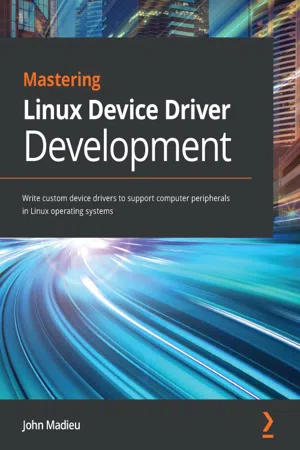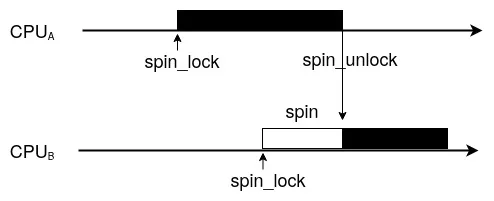
Mastering Linux Device Driver Development
Write custom device drivers to support computer peripherals in Linux operating systems
John Madieu
- 646 pagine
- English
- ePUB (disponibile sull'app)
- Disponibile su iOS e Android
Mastering Linux Device Driver Development
Write custom device drivers to support computer peripherals in Linux operating systems
John Madieu
Informazioni sul libro
Master the art of developing customized device drivers for your embedded Linux systemsKey Features• Stay up to date with the Linux PCI, ASoC, and V4L2 subsystems and write device drivers for them• Get to grips with the Linux kernel power management infrastructure• Adopt a practical approach to customizing your Linux environment using best practicesBook DescriptionLinux is one of the fastest-growing operating systems around the world, and in the last few years, the Linux kernel has evolved significantly to support a wide variety of embedded devices with its improved subsystems and a range of new features. With this book, you'll find out how you can enhance your skills to write custom device drivers for your Linux operating system.Mastering Linux Device Driver Development provides complete coverage of kernel topics, including video and audio frameworks, that usually go unaddressed. You'll work with some of the most complex and impactful Linux kernel frameworks, such as PCI, ALSA for SoC, and Video4Linux2, and discover expert tips and best practices along the way. In addition to this, you'll understand how to make the most of frameworks such as NVMEM and Watchdog. Once you've got to grips with Linux kernel helpers, you'll advance to working with special device types such as Multi-Function Devices (MFD) followed by video and audio device drivers.By the end of this book, you'll be able to write feature-rich device drivers and integrate them with some of the most complex Linux kernel frameworks, including V4L2 and ALSA for SoC.What you will learn• Explore and adopt Linux kernel helpers for locking, work deferral, and interrupt management• Understand the Regmap subsystem to manage memory accesses and work with the IRQ subsystem• Get to grips with the PCI subsystem and write reliable drivers for PCI devices• Write full multimedia device drivers using ALSA SoC and the V4L2 framework• Build power-aware device drivers using the kernel power management framework• Find out how to get the most out of miscellaneous kernel subsystems such as NVMEM and WatchdogWho this book is forThis book is for embedded developers, Linux system engineers, and system programmers who want to explore Linux kernel frameworks and subsystems. C programming skills and a basic understanding of driver development are necessary to get started with this book.
Domande frequenti
Informazioni
Section 1:Kernel Core Frameworks for Embedded Device Driver Development
- Chapter 1, Linux Kernel Concepts for Embedded Developers
- Chapter 2, Leveraging the Regmap API and Simplifying the Code
- Chapter 3, Delving into the MFD Subsystem and the Syscon API
- Chapter 4, Storming the Common Clock Framework
Chapter 1: Linux Kernel Concepts for Embedded Developers
- The kernel locking API and shared objects
- Work deferring mechanisms
- Linux kernel interrupt management
Technical requirements
- Advanced computer architecture knowledge and C programming skills
- Linux kernel 4.19 sources, available at https://github.com/torvalds/linux
The kernel locking API and shared objects
- Locks: Used for mutual exclusion. When one contender holds the lock, no other contender can hold it (others are excluded). The most well-known locking primitives in the kernel are spinlocks and mutexes.
- Conditional variables: Mostly used to sense or wait for a state change. These are implemented differently in the kernel, as we will see later, mainly in the Waiting, sensing, and blocking in the Linux kernel section.
- Wait queue: Mainly used to wait for a state change. It’s designed to work in concert with locks.
- Completion queue: Used to wait for a given computation to complete.
Spinlocks

Indice dei contenuti
- Mastering Linux Device Driver Development
- Why subscribe?
- Preface
- Section 1:Kernel Core Frameworks for Embedded Device Driver Development
- Chapter 1: Linux Kernel Concepts for Embedded Developers
- Chapter 2: Leveraging the Regmap API and Simplifying the Code
- Chapter 3: Delving into the MFD Subsystem and Syscon API
- Chapter 4: Storming the Common Clock Framework
- Section 2: Multimedia and Power Saving in Embedded Linux Systems
- Chapter 5: ALSA SoC Framework – Leveraging Codec and Platform Class Drivers
- Chapter 6: ALSA SoC Framework – Delving into the Machine Class Drivers
- Chapter 7: Demystifying V4L2 and Video Capture Device Drivers
- Chapter 8: Integrating with V4L2 Async and Media Controller Frameworks
- Chapter 9:Leveraging the V4L2 API from the User Space
- Chapter 10: Linux Kernel Power Management
- Section 3: Staying Up to Date with Other Linux Kernel Subsystems
- Chapter 11: Writing PCI Device Drivers
- Chapter 12: Leveraging the NVMEM Framework
- Chapter 13: Watchdog Device Drivers
- Chapter 14: Linux Kernel Debugging Tips and Best Practices
- Other Books You May Enjoy